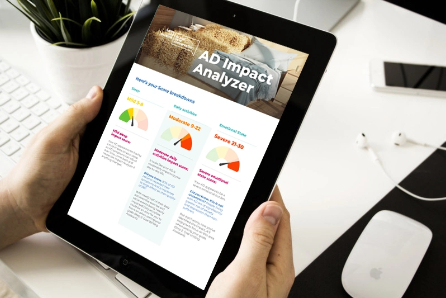STEP 1
Understand the impact of your eczema
Although eczema has clear physical symptoms, such as dry skin, it also has an invisible impact that needs to be understood. It could affect your life in many other indirect ways, including:
- Impacting your sleep pattern
- Causing difficulty in regular activities, such as doing the dishes or tidying up
- Affecting concentration levels
- Making you feel self-conscious or anxious
So, it's important that both you and your healthcare professional get a deeper understanding of the ways eczema impacts your daily life.
We’ve put together a list of questions to help you uncover the effect of AD across various aspects of day-to-day life.
Explore now: Eczema impact tool
It's normal if you've learnt to adjust and cope with your eczema.
Use this intuitive questionnaire to find out how you can assess the invisible impact on your daily life.
Your dermatology care team
A variety of healthcare professionals can offer different types of support in your search for management options that are right for you. It's valuable to know how these healthcare professionals differ and how you can access them.
Pharmacist
- Often your pharmacist is your first point of contact. They will give you guidance on over the counter treatments and will advise you with respect to any medicines you may have been prescribed.
- Depending on the severity of your eczema, they may recommend that you speak with your GP.
General Practitioner
- Often your General Practitioner is your second point of contact. Initially, they will perform an evaluation of your symptoms, consider factors such as your medical history and give you a diagnosis
- Depending on the severity of your eczema your GP may think you need more specialist care, because dermatologists have access to a wider range of eczema treatment options. Ask your GP if a referral to a dermatologist might be right for you
Dermatologist
- A dermatologist is a doctor who specialises in the treatment of skin conditions
- Dermatologists may provide more insights into your diagnosis, or discuss treatment options that may not have been considered previously
- Although dermatologists may not change your treatment regimen straight away, they can provide you with information on options to explore in the future
- Usually, you can only speak to a dermatologist after a referral from a GP. If you feel like you could benefit from speaking with a dermatologist, talk to your GP about getting a referral.
Date of preparation: June 2023 | IE-ABBV-230034
Information placed on this website is not intended as a substitute for consultation with your health care professional.
AbbVie Ireland: 14 Riverwalk, Citywest Business Campus, Dublin 24, D24 XN32, Ireland.
Tel (0) 1 4287900
www.abbvie.ie







